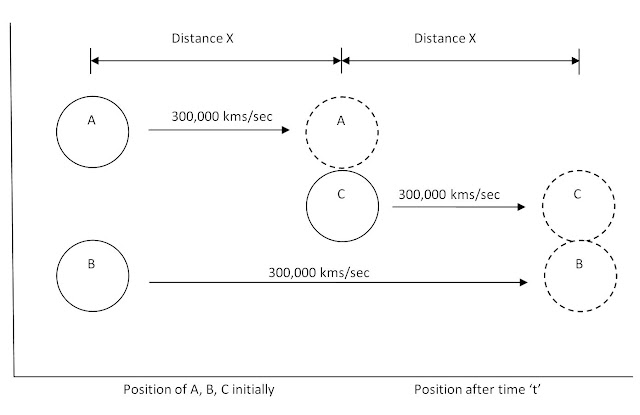The basic concept of Time and Space
The basic concept of Time and Space
To start with, let’s explore the basic properties of Dimensions
Basic dimensions: Mass, Length, Time, Temperature etc.
S.I. Unit of dimensions: Kilogram, Meter, Second, Kelvin etc.
Mathematical entities: Volume, Cube, Line, Area, Triangle etc.
Dimension: It can be defined as the measure of a particular property of an entity.
Such as length of a line is not a physical entity itself whereas in case of length of a box, the box is a physical entity measured/described by dimension.
Hypothesis to define Time and Space
Proposition 1: Existence is the only physical entity and all the dimensions such as Mass, Length, Time and Temperature etc. are the form of mathematical construct to measure/describe it.
Proposition 2: Time is a mathematical dimension to measure the change of state (any motion) of Existence (includes universe/multiverse).
Proposition 3: Space is a mathematical dimension to measure the spatial expanse of Existence (includes emptiness and non-emptiness).
Existence is the only physical entity
Existence is the ability of an entity to interact with physical or
mental reality. In philosophy, it refers to
the ontological property of being. In this research, the
word Entire-Existence denoted by ‘EE’ has been particularly chosen as it fits
into all the criteria mentioned below.
Properties:
1.
EE is the one all inclusive entity that includes Entire Creation i.e.
observable Universe and the Universe/Multiverse beyond observable limits, both.
2.
EE is self-existing
entity by itself because nothing else existed beyond to create it. EE consists of all entities that ever
existed or existing now or ever will exist.
3.
EE is a multi-dimensional entity which has always been changing its state
continuously. The
dimensions such as Mass, Length, Time, Temperature etc. are the mathematical
construct to measure/describe the state of EE/part of EE.
4. EE consists of all other entities such as matter, antimatter, waves, energy, force fields, spatial expanse (Spatial expanse includes emptiness and non emptiness both) etc.
Hence,
Entire-Existence (EE) can be defined as the one all
inclusive, self-existing multi-dimensional entity, it consists of all entities
that ever existed or existing now or ever will exist.
Non-Existence (NE) can be considered as an exclusion from Entire Existence. It can be defined as an entity that is not the part of EE and therefore it cannot exist anywhere anytime.
State of Entire Existence
Particular state of EE can be defined as a particular state with
no change of state (no motion at all) of any entity of EE. In simple words it
is like a picture captured of a moving object.
The duration of this particular state can be
represented as “Δ t = 0”
Change of state of EE can be defined as the change of state
(any motion) of any single or multiple entity of EE that happened. There is
always a continuous change of state of EE.
The duration of this change of state can be
represented as “Δ t ≠ 0”
Spatial expanse of Entire Existence
It can be defined as a physical entity (part of EE) which can
contain nothing inside it (emptiness) or some physical entity filling it
(non-emptiness).
Note: Vacuum does not mean spatial expanse, it just represents
emptiness, while spatial expanse includes vacuum and non-vacuum both.
The density outside the earth’s atmosphere is less than one hydrogen
atom per cubic cm. So we can consider the distance between the two hydrogen
atoms is min. one cm. Only if we consider spatial expanse as a physical entity
of Existence between them, then only we will be able to observe the distance between
two hydrogen atoms. Else we would not be able to observe the distance between
them, because there is empty vacuum only and nothing else exists between them.
And if we consider this empty spatial expanse as Non-Existence then there
should not be any distance between them.
Variable speed of Light and variable Time dilation on clocks
Basic assumption paradox in Special theory of Relativity: This is one of the most fundamental paradox in the basic assumptions of Special theory of relativity. This theory is based on this basic postulate that the speed of light is constant in vacuum irrespective of speed of observer and source of light. The implication of this postulate was that speed-related measurements and duration were changed in order to accommodate this theory.
Let’s
understand this from a hypothetical case (See picture):
If an object ‘A’ and an
object ‘B’ (‘B’ part of light beam) are initially at same location and moving
towards object ‘C’ (located at ‘X’ distance apart initially) with the velocity
of 300,000 kms per second. And ‘C’ is also moving ahead in same direction of
‘A’ and ‘B’ with same velocity of 300,000 kms per second. In this case, ‘A’
won’t be able to reach ‘C’ because the relative velocity between them would be
zero and ‘A’ would remain in rest with respect to ‘C’ with same distance
between them ‘X’ after time t. However ‘B’ will still be able to reach ‘C’ with
the velocity of 300,000 kms per second as it is a part of light beam. (Speed of
‘B’ will remain constant with respect to ‘C’ as per the basic postulate of
special relativity theory).
The basic assumption of this
theory is that the velocity of light will remain constant irrespective of
velocity of observer and source of light. It raises a serious contradiction
that why velocity of ‘B’ (part of light beam) remained constant with respect to
‘C’ moving with same velocity in same direction. In addition to that if ‘C’
would also be a part of another light beam, then under this condition, velocity
between two light photons would be relative or constant?
According
to General Theory of Relativity,
spacetime is dynamically curved due to the presence of matter. It causes time dilation
depending upon the curvature of spacetime (Gravity). This
time dilation effect has been observed through various experiments in the
history.
It needs to
be mentioned here that there is no such empirical investigation done so far to
check equal time dilation on all variety of clocks (based on different
technology). If the time dilation is different then it cannot be called as
actual time dilation but the local physical effect on the clocks. The laws of
existence affect all the physical entities in a different way. All the physical
entities have
a different effect of gravity and velocity on them depending on their nature.
There is no
empirical evidence that Spacetime is a physical entity except that there is
time dilation effect on clocks. If Time and Space are just a mathematical
construct to measure describe Entire Existence which is the only physical
entity then this hypothesis can be said as true.
Testable Predictions based on this
theory
This theory puts forward the concept that Existence/Creation is the only physical entity where we exist and all the dimensions are a form of knowledge to measure/describe it. It will change the whole concept of Time and Space from being a physical entity to a pure Mathematical dimension like other dimensions such as Mass, length, temperature etc. Eventually, it will end all the possibilities of time travel and related paradoxes because one has to change the state of entire existence into past/future state in order to travel in time which is not possible. However, it will open the possibilities to measure beyond Bigbang and expand the horizons of our present knowledge.
Source:
https://absolute-time-space.com
https://books.google.com/books?id=uQfhDwAAQBAJ









Comments
Post a Comment